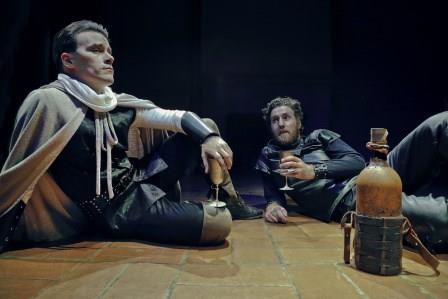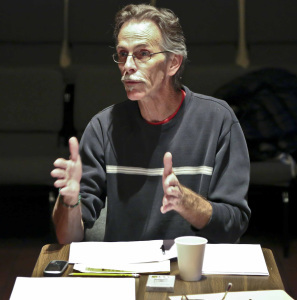The ancient Chinese philosopher and military strategist, Sun Tzu, is noted for his thoughts on combat. In his famous work, The Art of War, he offers surprising opinions about how to respect, annoy, and engage with one's enemies.
If there is a shocking difference to be found when comparing ancient and modern tales of war, it is the level of respect a professional warrior might feel for his opponent. From the ancient Greeks to Shakespeare's militaristic Coriolanus, a hard man was almost always good to find. These days, they're mostly just psychopaths with expensive toys.
As old-school Republicans like Ron Christie clutch their pearls and wet their pants while agonizing over pictures that show President Obama making a weekend phone call to Vladimir Putin while casually clad in jeans and a button-down shirt, stronger minds have prevailed in the creation of two fascinating new works.
The 2014 CAAMFest recently presented another quartet of short films under the umbrella title of Beautiful 2013. Produced by the Chinese video hosting service, Youku, some of these are tightly scripted gems; others take an unexpected look at what might constitute one man's perception of beauty.
In Kiyoshi Kurasowa's short entitled Beautiful New Bay Area Project, a somewhat goofy project development manager becomes infatuated with a female dockworker. The young woman is quite clear on her status as a laborer (as opposed to management), and has a concise sense of boundaries that should always be respected.
However, when the project manager steals her nameplate from work, he detonates an explosion of martial arts fury in which the young woman destroys his security detail, his office, and anything else that gets in her way. Even after he has had the shit kicked out of him, all the project manager can do is look up at her in wonder and gasp "Beautiful!" Here's the trailer:
* * * * * * * * * *
You won't witness any martial arts fighting in The Lion and the Fox, a challenging new drama by Gary Graves which recently received its belated world premiere from CentralWorks. Meticulously directed by Jan Zvaifler, this intimate study of how absolute power corrupts absolutely focuses on two key historical figures: Niccolo Machiavelli and Cesare Borgia. The fact that the actor portraying Macchiavelli (Benjamin Stowe) looks like a young Mitt Romney only adds to the fun and evil.
![2014-03-08-nicolacesaresitting.jpg]()
Niccolo Machiavelli (Benjamin Stowe) and Cesare Borgia
(Lucas Hatton) in The Lion and the Fox (Photo by: Jim Norrena)
In The Lion and the Fox, Cesare Borgia is half tyrant, half psychopath -- a man who is willing to let his soldiers rape and slaughter innocent villagers as a reward for a job well done. Long before the term collateral damage was identified as a cost of war, raping and pillaging was just an exaggerated case of "boys being boys."
Borgia is incredibly wealthy, a fierce warrior, an unnaturally handsome soldier, and a brilliant military strategist. With Leonardo da Vinci serving him as the architect of Borgia's fearsome war machine, it would seem as if nothing could get in the way of Borgia's ambitions -- not even the French!
![2014-03-08-lucashattoncesare.jpg]()
Lucas Hatton as Cesare Borgia in The Lion and the Fox
(Photo by: Jim Norrena)
Therein lies the tale which kept eluding Gary Graves. As the playwright recalls:
![2014-03-08-garygraves.jpg]()
Playwright Gary Graves (Photo by: Jim Norrena)
![2014-03-08-benjaminlucasheads.jpg]()
Niccolo Machiavelli (Benjamin Stowe) and Cesare Borgia
(Lucas Hatton) in The Lion and the Fox (Photo by: Jim Norrena)
Some plays are well worth the wait, and I would definitely include The Lion and the Fox in that category. Because CentralWorks creates its plays using an extremely organic process that is guided by people who have worked together for nearly two decades, a complex, historically inspired work like this receives a great deal of loving attention. The fact that the creative team knows how to make maximum use of the intimate performance space in the Berkeley City Club allows them to convince the audience that they are privy to great acts of gore as well as villages being burned to the ground (just out of eyesight).
All of this was accomplished with Scharpen's superb sound design, some nuanced lighting, and Zvaifler's carefully balanced direction of the two leads. As with many works written by Graves, the evening found its true strength in the playwright's skill as a lean and muscular wordsmith -- a skill set which should not be taken lightly.
Benjamin Stowe and Lucas Hatton delivered riveting performances as Machiavelli and Borgia in an in-your-face environment which made audiences feel as if they were examining history through a microscope. If you crave stripped-down, intellectually challenging theatre that burns with passion, intelligence, suspense and a bit of poison, this show is for you.
To read more of George Heymont go to My Cultural Landscape
If there is a shocking difference to be found when comparing ancient and modern tales of war, it is the level of respect a professional warrior might feel for his opponent. From the ancient Greeks to Shakespeare's militaristic Coriolanus, a hard man was almost always good to find. These days, they're mostly just psychopaths with expensive toys.
As old-school Republicans like Ron Christie clutch their pearls and wet their pants while agonizing over pictures that show President Obama making a weekend phone call to Vladimir Putin while casually clad in jeans and a button-down shirt, stronger minds have prevailed in the creation of two fascinating new works.
The 2014 CAAMFest recently presented another quartet of short films under the umbrella title of Beautiful 2013. Produced by the Chinese video hosting service, Youku, some of these are tightly scripted gems; others take an unexpected look at what might constitute one man's perception of beauty.
In Kiyoshi Kurasowa's short entitled Beautiful New Bay Area Project, a somewhat goofy project development manager becomes infatuated with a female dockworker. The young woman is quite clear on her status as a laborer (as opposed to management), and has a concise sense of boundaries that should always be respected.
However, when the project manager steals her nameplate from work, he detonates an explosion of martial arts fury in which the young woman destroys his security detail, his office, and anything else that gets in her way. Even after he has had the shit kicked out of him, all the project manager can do is look up at her in wonder and gasp "Beautiful!" Here's the trailer:
You won't witness any martial arts fighting in The Lion and the Fox, a challenging new drama by Gary Graves which recently received its belated world premiere from CentralWorks. Meticulously directed by Jan Zvaifler, this intimate study of how absolute power corrupts absolutely focuses on two key historical figures: Niccolo Machiavelli and Cesare Borgia. The fact that the actor portraying Macchiavelli (Benjamin Stowe) looks like a young Mitt Romney only adds to the fun and evil.

Niccolo Machiavelli (Benjamin Stowe) and Cesare Borgia
(Lucas Hatton) in The Lion and the Fox (Photo by: Jim Norrena)
In The Lion and the Fox, Cesare Borgia is half tyrant, half psychopath -- a man who is willing to let his soldiers rape and slaughter innocent villagers as a reward for a job well done. Long before the term collateral damage was identified as a cost of war, raping and pillaging was just an exaggerated case of "boys being boys."
Borgia is incredibly wealthy, a fierce warrior, an unnaturally handsome soldier, and a brilliant military strategist. With Leonardo da Vinci serving him as the architect of Borgia's fearsome war machine, it would seem as if nothing could get in the way of Borgia's ambitions -- not even the French!

Lucas Hatton as Cesare Borgia in The Lion and the Fox
(Photo by: Jim Norrena)
Therein lies the tale which kept eluding Gary Graves. As the playwright recalls:
In 2009, we embarked on a project called Machiavelli's The Prince. That project was originally conceived as a play with three characters: Niccolo Machiavelli, Lorenzino de Medici (the new duke of Florence) and Cesare Borgia (the central figure in Machiavelli's famous little book). After a fantastic trip to Italy to see all the places where the play unfolds and several months of developmental workshops, just a week before rehearsals were set to begin I found myself in the unenviable position of having to inform the actors and the rest of the collaborative team that we had no play. I was stymied. I could not figure out how to intertwine the two stories in the play as I had intended. First, there was the story of the interaction between Machiavelli and the new duke of Florence, Lorenzino. This is the figure to whom Machiavelli presents the first copy of The Prince as a gift, hoping to enter into his service. The other story was about Machiavelli's encounter with Cesare Borgia, one of the most notorious villains in history. One of two actors was supposed to play both roles (Lorenzino and Cesare) as the play moved back and forth between the two stories. But it didn't work. I just couldn't figure it out. One week till rehearsals begin and no script. Not good.

Playwright Gary Graves (Photo by: Jim Norrena)
Everyone was remarkably good natured about the disastrous position I had thrust us all into. We talked. We brainstormed. We came up with an idea: Just tell the one story about Machiavelli and Lorenzino and write it really quickly. In two weeks we were in rehearsal (one week late), and, astonishingly, the play turned out to be one of our most popular productions ever, thanks in no small part to the amazing team that put the show together (actors Richard Frederick and Michael Navarra, sound designer Greg Scharpen, costume designer Tammy Berlin, and producer Jan Zvaifler). But Cesare wouldn't leave me alone. His story, and his doings with Machiavelli, kept calling to me, gnawing at me, working on me. Finally, last year, I understood how the two stories work together: first Cesare's story constitutes Part One, and then Lorenzino's story follows as Part Two. So now, five years later, we're opening Part One of Machiavelli and The Prince: The Lion and the Fox.

Niccolo Machiavelli (Benjamin Stowe) and Cesare Borgia
(Lucas Hatton) in The Lion and the Fox (Photo by: Jim Norrena)
Some plays are well worth the wait, and I would definitely include The Lion and the Fox in that category. Because CentralWorks creates its plays using an extremely organic process that is guided by people who have worked together for nearly two decades, a complex, historically inspired work like this receives a great deal of loving attention. The fact that the creative team knows how to make maximum use of the intimate performance space in the Berkeley City Club allows them to convince the audience that they are privy to great acts of gore as well as villages being burned to the ground (just out of eyesight).
All of this was accomplished with Scharpen's superb sound design, some nuanced lighting, and Zvaifler's carefully balanced direction of the two leads. As with many works written by Graves, the evening found its true strength in the playwright's skill as a lean and muscular wordsmith -- a skill set which should not be taken lightly.
Benjamin Stowe and Lucas Hatton delivered riveting performances as Machiavelli and Borgia in an in-your-face environment which made audiences feel as if they were examining history through a microscope. If you crave stripped-down, intellectually challenging theatre that burns with passion, intelligence, suspense and a bit of poison, this show is for you.
To read more of George Heymont go to My Cultural Landscape